An Analysis of Parenting Styles and Child Behavior in Singapore
VerifiedAdded on 2023/01/23
|35
|6187
|46
Report
AI Summary
This report investigates the impact of parenting styles on children's behavior in Singapore. The study analyzes semi-structured interviews with seven parents, examining authoritarian, authoritative, and permissive parenting styles. The research explores the correlation between parenting approaches and children's attitudes in school. The findings suggest that authoritative parenting is associated with positive child behavior, while authoritarian parenting may lead to difficulties. The report includes thematic analysis and graphical representations to support its conclusions, emphasizing the importance of parenting in shaping children's development. The study concludes that parenting styles significantly influence children's behavioral and psychological outcomes, highlighting the need for supportive and nurturing parenting practices.
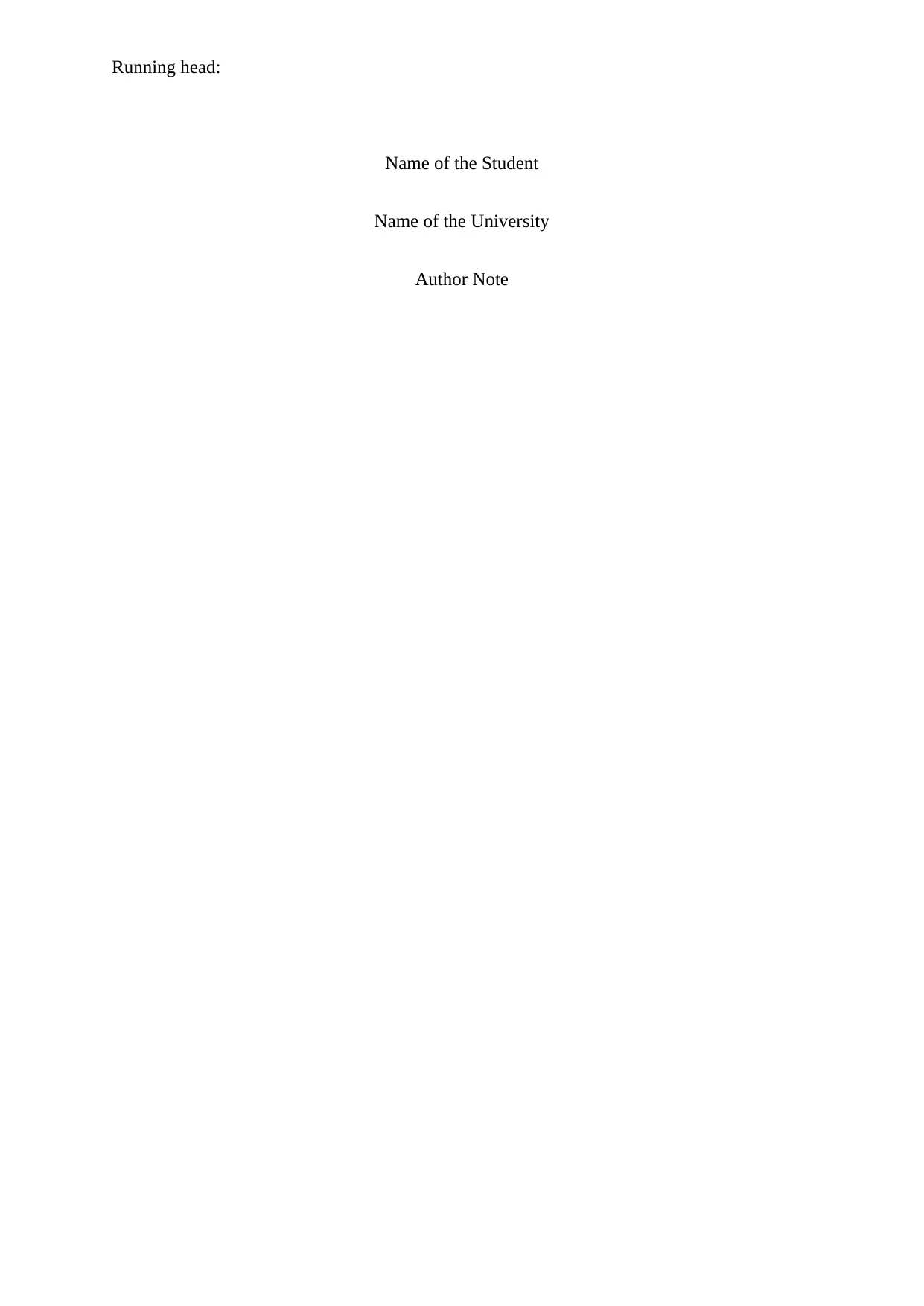
Running head:
Name of the Student
Name of the University
Author Note
Name of the Student
Name of the University
Author Note
Paraphrase This Document
Need a fresh take? Get an instant paraphrase of this document with our AI Paraphraser
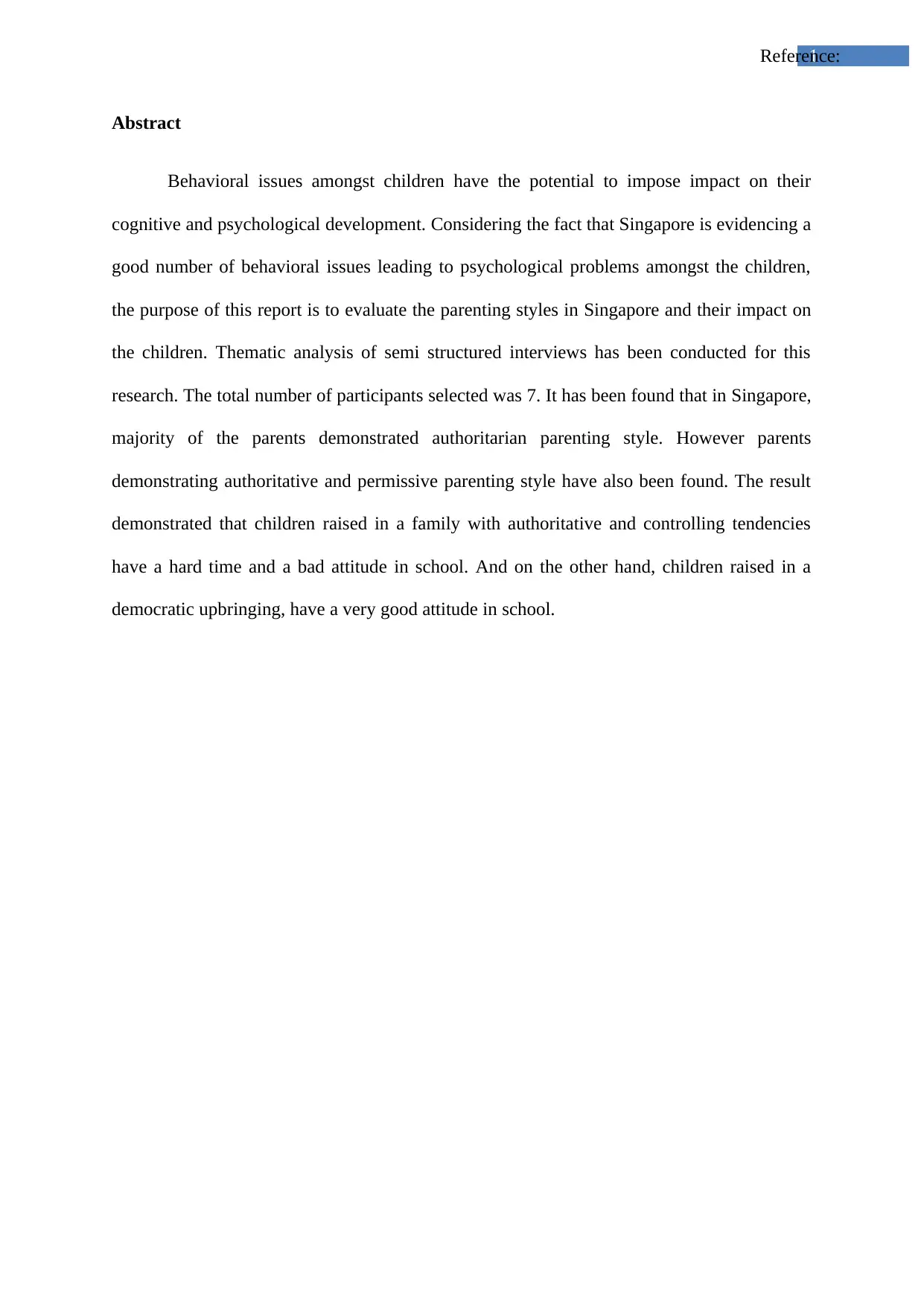
1Reference:
Abstract
Behavioral issues amongst children have the potential to impose impact on their
cognitive and psychological development. Considering the fact that Singapore is evidencing a
good number of behavioral issues leading to psychological problems amongst the children,
the purpose of this report is to evaluate the parenting styles in Singapore and their impact on
the children. Thematic analysis of semi structured interviews has been conducted for this
research. The total number of participants selected was 7. It has been found that in Singapore,
majority of the parents demonstrated authoritarian parenting style. However parents
demonstrating authoritative and permissive parenting style have also been found. The result
demonstrated that children raised in a family with authoritative and controlling tendencies
have a hard time and a bad attitude in school. And on the other hand, children raised in a
democratic upbringing, have a very good attitude in school.
Abstract
Behavioral issues amongst children have the potential to impose impact on their
cognitive and psychological development. Considering the fact that Singapore is evidencing a
good number of behavioral issues leading to psychological problems amongst the children,
the purpose of this report is to evaluate the parenting styles in Singapore and their impact on
the children. Thematic analysis of semi structured interviews has been conducted for this
research. The total number of participants selected was 7. It has been found that in Singapore,
majority of the parents demonstrated authoritarian parenting style. However parents
demonstrating authoritative and permissive parenting style have also been found. The result
demonstrated that children raised in a family with authoritative and controlling tendencies
have a hard time and a bad attitude in school. And on the other hand, children raised in a
democratic upbringing, have a very good attitude in school.
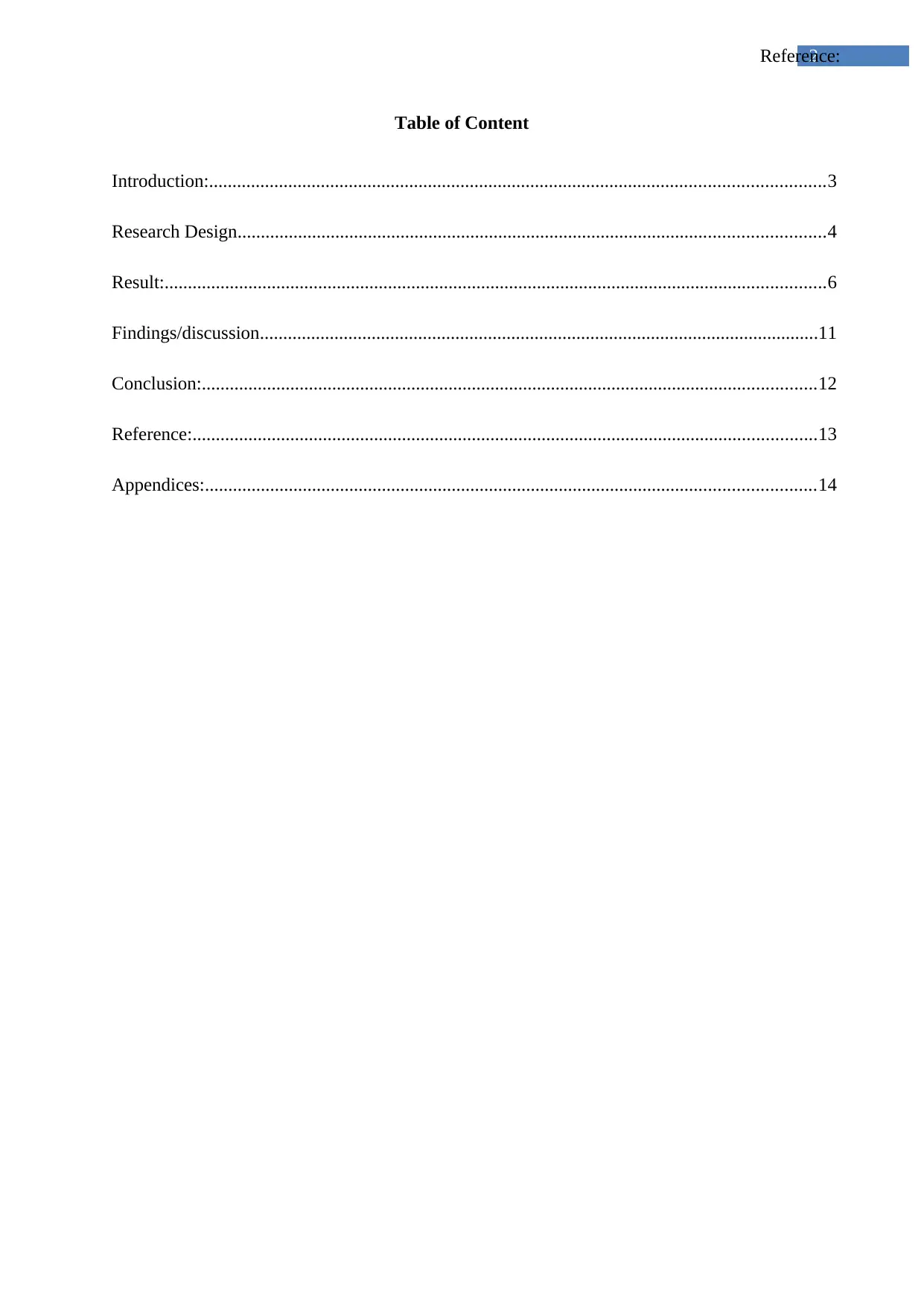
2Reference:
Table of Content
Introduction:....................................................................................................................................3
Research Design..............................................................................................................................4
Result:..............................................................................................................................................6
Findings/discussion........................................................................................................................11
Conclusion:....................................................................................................................................12
Reference:......................................................................................................................................13
Appendices:...................................................................................................................................14
Table of Content
Introduction:....................................................................................................................................3
Research Design..............................................................................................................................4
Result:..............................................................................................................................................6
Findings/discussion........................................................................................................................11
Conclusion:....................................................................................................................................12
Reference:......................................................................................................................................13
Appendices:...................................................................................................................................14
⊘ This is a preview!⊘
Do you want full access?
Subscribe today to unlock all pages.

Trusted by 1+ million students worldwide
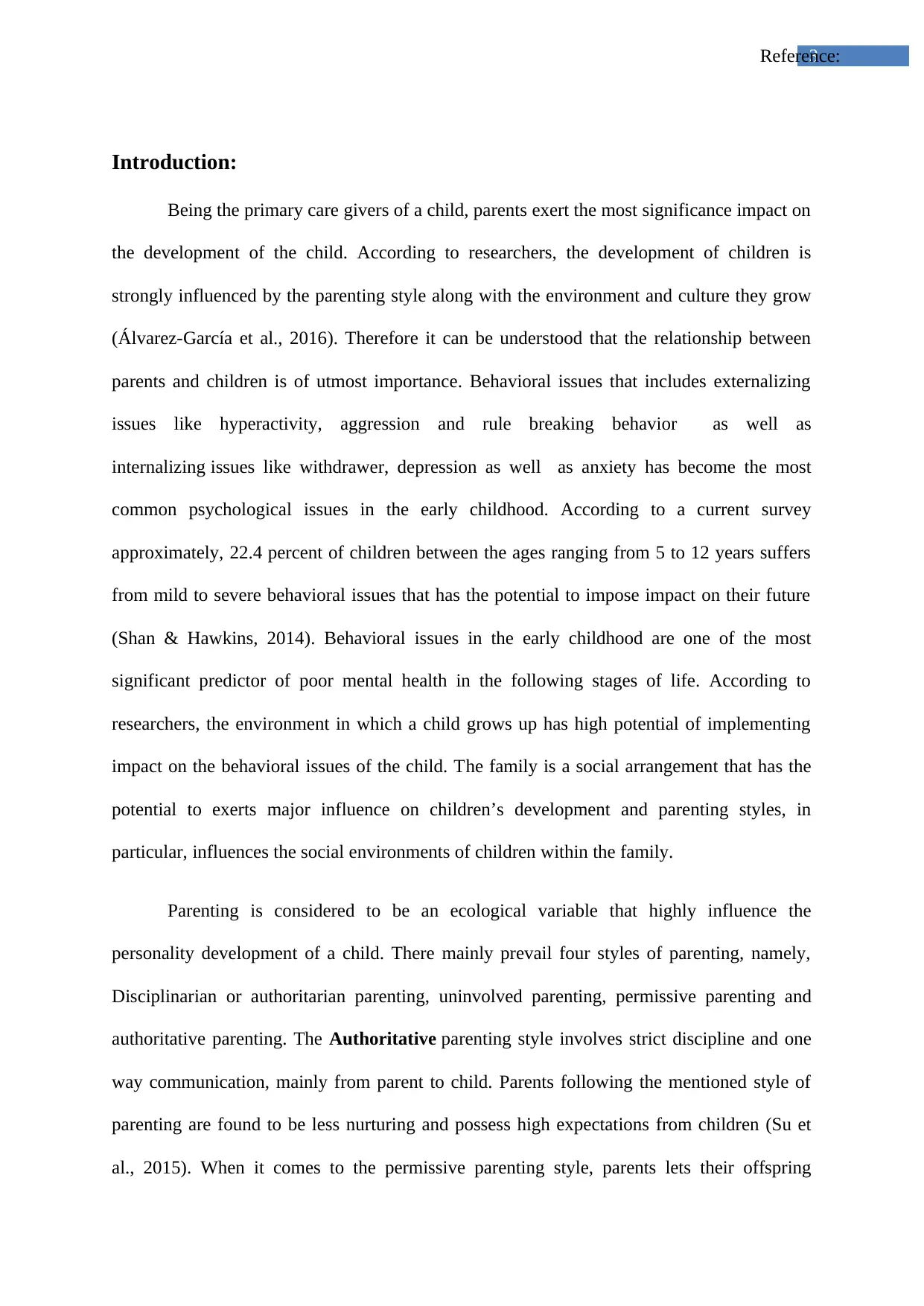
3Reference:
Introduction:
Being the primary care givers of a child, parents exert the most significance impact on
the development of the child. According to researchers, the development of children is
strongly influenced by the parenting style along with the environment and culture they grow
(Álvarez-García et al., 2016). Therefore it can be understood that the relationship between
parents and children is of utmost importance. Behavioral issues that includes externalizing
issues like hyperactivity, aggression and rule breaking behavior as well as
internalizing issues like withdrawer, depression as well as anxiety has become the most
common psychological issues in the early childhood. According to a current survey
approximately, 22.4 percent of children between the ages ranging from 5 to 12 years suffers
from mild to severe behavioral issues that has the potential to impose impact on their future
(Shan & Hawkins, 2014). Behavioral issues in the early childhood are one of the most
significant predictor of poor mental health in the following stages of life. According to
researchers, the environment in which a child grows up has high potential of implementing
impact on the behavioral issues of the child. The family is a social arrangement that has the
potential to exerts major influence on children’s development and parenting styles, in
particular, influences the social environments of children within the family.
Parenting is considered to be an ecological variable that highly influence the
personality development of a child. There mainly prevail four styles of parenting, namely,
Disciplinarian or authoritarian parenting, uninvolved parenting, permissive parenting and
authoritative parenting. The Authoritative parenting style involves strict discipline and one
way communication, mainly from parent to child. Parents following the mentioned style of
parenting are found to be less nurturing and possess high expectations from children (Su et
al., 2015). When it comes to the permissive parenting style, parents lets their offspring
Introduction:
Being the primary care givers of a child, parents exert the most significance impact on
the development of the child. According to researchers, the development of children is
strongly influenced by the parenting style along with the environment and culture they grow
(Álvarez-García et al., 2016). Therefore it can be understood that the relationship between
parents and children is of utmost importance. Behavioral issues that includes externalizing
issues like hyperactivity, aggression and rule breaking behavior as well as
internalizing issues like withdrawer, depression as well as anxiety has become the most
common psychological issues in the early childhood. According to a current survey
approximately, 22.4 percent of children between the ages ranging from 5 to 12 years suffers
from mild to severe behavioral issues that has the potential to impose impact on their future
(Shan & Hawkins, 2014). Behavioral issues in the early childhood are one of the most
significant predictor of poor mental health in the following stages of life. According to
researchers, the environment in which a child grows up has high potential of implementing
impact on the behavioral issues of the child. The family is a social arrangement that has the
potential to exerts major influence on children’s development and parenting styles, in
particular, influences the social environments of children within the family.
Parenting is considered to be an ecological variable that highly influence the
personality development of a child. There mainly prevail four styles of parenting, namely,
Disciplinarian or authoritarian parenting, uninvolved parenting, permissive parenting and
authoritative parenting. The Authoritative parenting style involves strict discipline and one
way communication, mainly from parent to child. Parents following the mentioned style of
parenting are found to be less nurturing and possess high expectations from children (Su et
al., 2015). When it comes to the permissive parenting style, parents lets their offspring
Paraphrase This Document
Need a fresh take? Get an instant paraphrase of this document with our AI Paraphraser
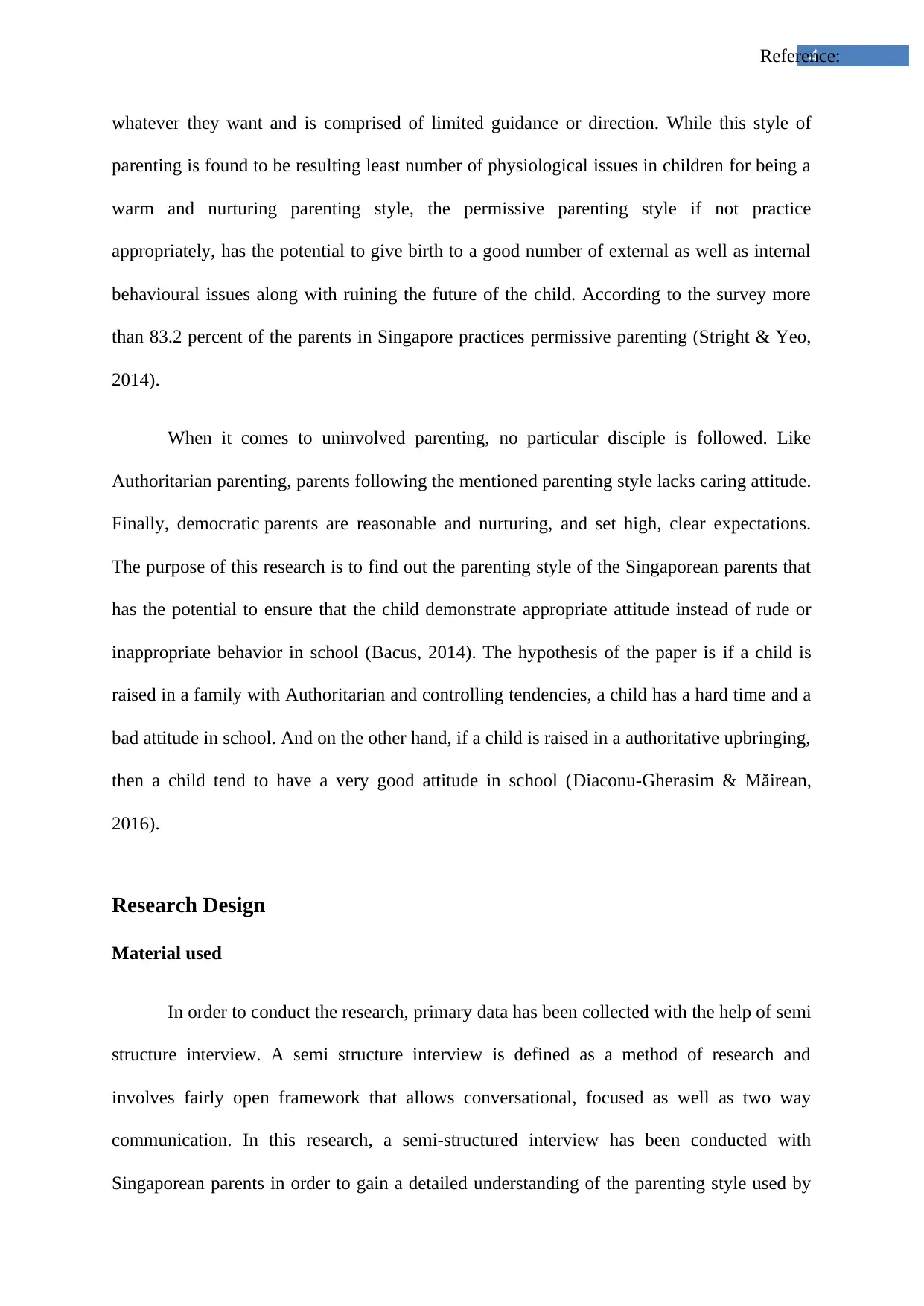
4Reference:
whatever they want and is comprised of limited guidance or direction. While this style of
parenting is found to be resulting least number of physiological issues in children for being a
warm and nurturing parenting style, the permissive parenting style if not practice
appropriately, has the potential to give birth to a good number of external as well as internal
behavioural issues along with ruining the future of the child. According to the survey more
than 83.2 percent of the parents in Singapore practices permissive parenting (Stright & Yeo,
2014).
When it comes to uninvolved parenting, no particular disciple is followed. Like
Authoritarian parenting, parents following the mentioned parenting style lacks caring attitude.
Finally, democratic parents are reasonable and nurturing, and set high, clear expectations.
The purpose of this research is to find out the parenting style of the Singaporean parents that
has the potential to ensure that the child demonstrate appropriate attitude instead of rude or
inappropriate behavior in school (Bacus, 2014). The hypothesis of the paper is if a child is
raised in a family with Authoritarian and controlling tendencies, a child has a hard time and a
bad attitude in school. And on the other hand, if a child is raised in a authoritative upbringing,
then a child tend to have a very good attitude in school (Diaconu-Gherasim & Măirean,
2016).
Research Design
Material used
In order to conduct the research, primary data has been collected with the help of semi
structure interview. A semi structure interview is defined as a method of research and
involves fairly open framework that allows conversational, focused as well as two way
communication. In this research, a semi-structured interview has been conducted with
Singaporean parents in order to gain a detailed understanding of the parenting style used by
whatever they want and is comprised of limited guidance or direction. While this style of
parenting is found to be resulting least number of physiological issues in children for being a
warm and nurturing parenting style, the permissive parenting style if not practice
appropriately, has the potential to give birth to a good number of external as well as internal
behavioural issues along with ruining the future of the child. According to the survey more
than 83.2 percent of the parents in Singapore practices permissive parenting (Stright & Yeo,
2014).
When it comes to uninvolved parenting, no particular disciple is followed. Like
Authoritarian parenting, parents following the mentioned parenting style lacks caring attitude.
Finally, democratic parents are reasonable and nurturing, and set high, clear expectations.
The purpose of this research is to find out the parenting style of the Singaporean parents that
has the potential to ensure that the child demonstrate appropriate attitude instead of rude or
inappropriate behavior in school (Bacus, 2014). The hypothesis of the paper is if a child is
raised in a family with Authoritarian and controlling tendencies, a child has a hard time and a
bad attitude in school. And on the other hand, if a child is raised in a authoritative upbringing,
then a child tend to have a very good attitude in school (Diaconu-Gherasim & Măirean,
2016).
Research Design
Material used
In order to conduct the research, primary data has been collected with the help of semi
structure interview. A semi structure interview is defined as a method of research and
involves fairly open framework that allows conversational, focused as well as two way
communication. In this research, a semi-structured interview has been conducted with
Singaporean parents in order to gain a detailed understanding of the parenting style used by
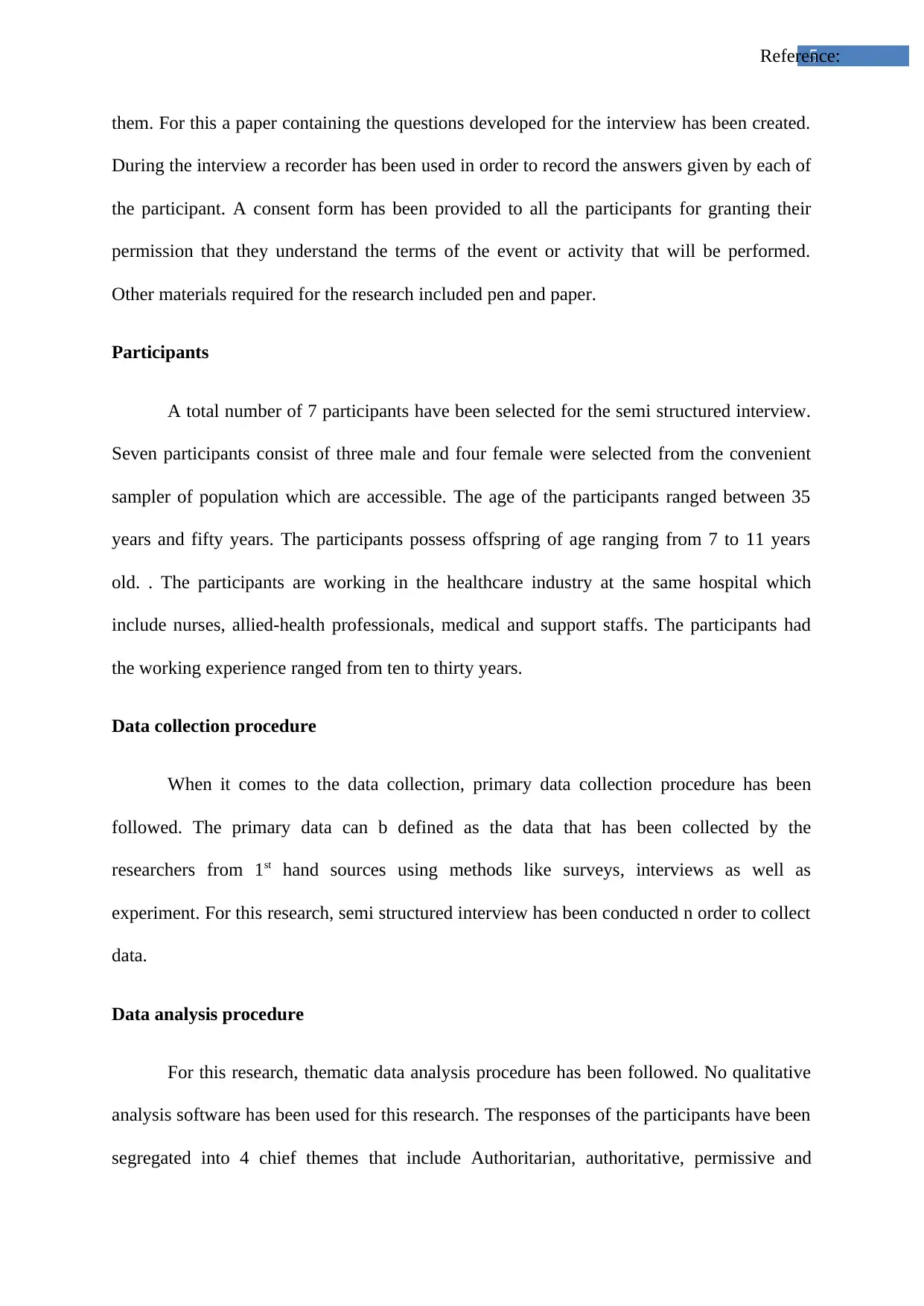
5Reference:
them. For this a paper containing the questions developed for the interview has been created.
During the interview a recorder has been used in order to record the answers given by each of
the participant. A consent form has been provided to all the participants for granting their
permission that they understand the terms of the event or activity that will be performed.
Other materials required for the research included pen and paper.
Participants
A total number of 7 participants have been selected for the semi structured interview.
Seven participants consist of three male and four female were selected from the convenient
sampler of population which are accessible. The age of the participants ranged between 35
years and fifty years. The participants possess offspring of age ranging from 7 to 11 years
old. . The participants are working in the healthcare industry at the same hospital which
include nurses, allied-health professionals, medical and support staffs. The participants had
the working experience ranged from ten to thirty years.
Data collection procedure
When it comes to the data collection, primary data collection procedure has been
followed. The primary data can b defined as the data that has been collected by the
researchers from 1st hand sources using methods like surveys, interviews as well as
experiment. For this research, semi structured interview has been conducted n order to collect
data.
Data analysis procedure
For this research, thematic data analysis procedure has been followed. No qualitative
analysis software has been used for this research. The responses of the participants have been
segregated into 4 chief themes that include Authoritarian, authoritative, permissive and
them. For this a paper containing the questions developed for the interview has been created.
During the interview a recorder has been used in order to record the answers given by each of
the participant. A consent form has been provided to all the participants for granting their
permission that they understand the terms of the event or activity that will be performed.
Other materials required for the research included pen and paper.
Participants
A total number of 7 participants have been selected for the semi structured interview.
Seven participants consist of three male and four female were selected from the convenient
sampler of population which are accessible. The age of the participants ranged between 35
years and fifty years. The participants possess offspring of age ranging from 7 to 11 years
old. . The participants are working in the healthcare industry at the same hospital which
include nurses, allied-health professionals, medical and support staffs. The participants had
the working experience ranged from ten to thirty years.
Data collection procedure
When it comes to the data collection, primary data collection procedure has been
followed. The primary data can b defined as the data that has been collected by the
researchers from 1st hand sources using methods like surveys, interviews as well as
experiment. For this research, semi structured interview has been conducted n order to collect
data.
Data analysis procedure
For this research, thematic data analysis procedure has been followed. No qualitative
analysis software has been used for this research. The responses of the participants have been
segregated into 4 chief themes that include Authoritarian, authoritative, permissive and
⊘ This is a preview!⊘
Do you want full access?
Subscribe today to unlock all pages.

Trusted by 1+ million students worldwide
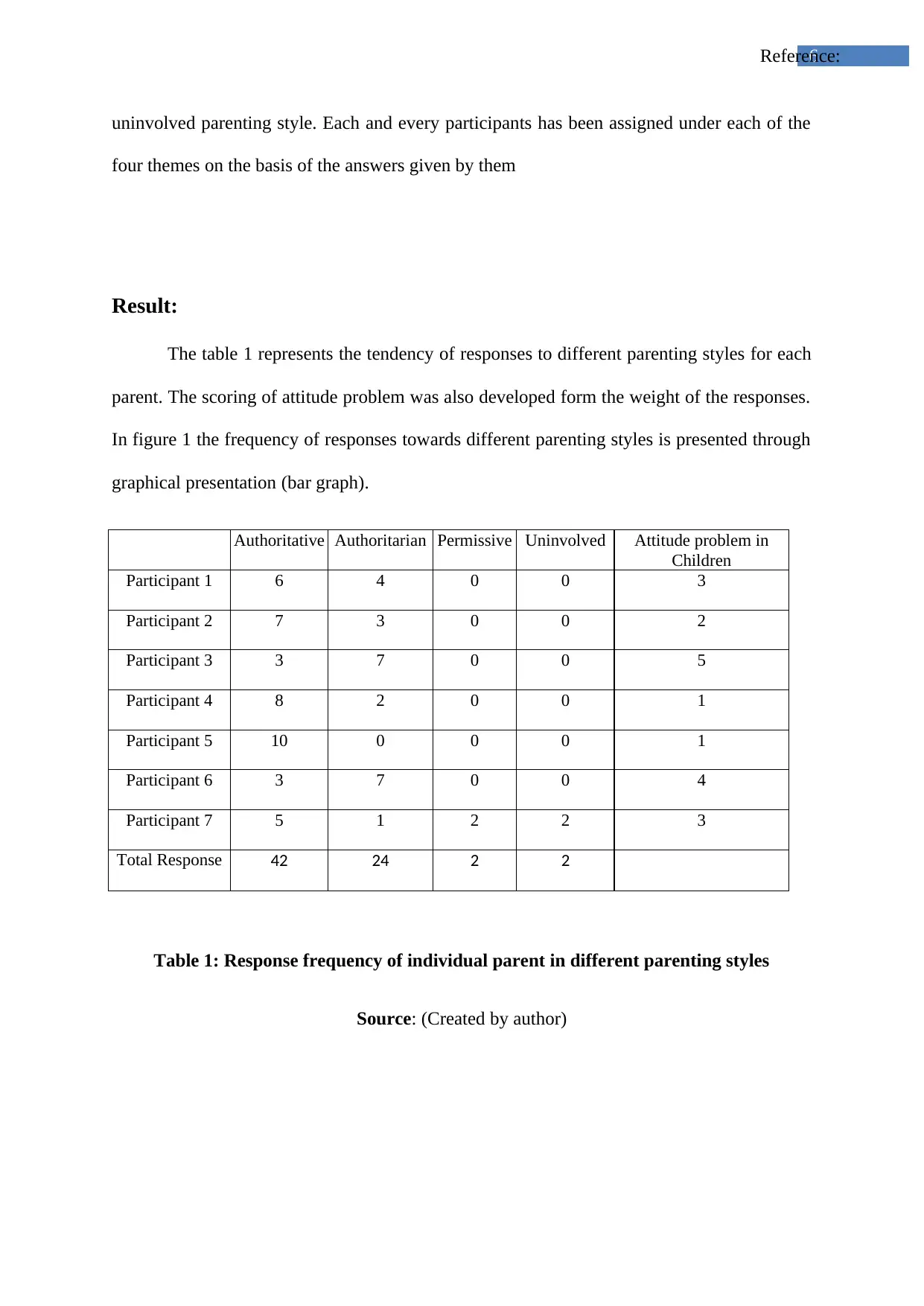
6Reference:
uninvolved parenting style. Each and every participants has been assigned under each of the
four themes on the basis of the answers given by them
Result:
The table 1 represents the tendency of responses to different parenting styles for each
parent. The scoring of attitude problem was also developed form the weight of the responses.
In figure 1 the frequency of responses towards different parenting styles is presented through
graphical presentation (bar graph).
Authoritative Authoritarian Permissive Uninvolved Attitude problem in
Children
Participant 1 6 4 0 0 3
Participant 2 7 3 0 0 2
Participant 3 3 7 0 0 5
Participant 4 8 2 0 0 1
Participant 5 10 0 0 0 1
Participant 6 3 7 0 0 4
Participant 7 5 1 2 2 3
Total Response 42 24 2 2
Table 1: Response frequency of individual parent in different parenting styles
Source: (Created by author)
uninvolved parenting style. Each and every participants has been assigned under each of the
four themes on the basis of the answers given by them
Result:
The table 1 represents the tendency of responses to different parenting styles for each
parent. The scoring of attitude problem was also developed form the weight of the responses.
In figure 1 the frequency of responses towards different parenting styles is presented through
graphical presentation (bar graph).
Authoritative Authoritarian Permissive Uninvolved Attitude problem in
Children
Participant 1 6 4 0 0 3
Participant 2 7 3 0 0 2
Participant 3 3 7 0 0 5
Participant 4 8 2 0 0 1
Participant 5 10 0 0 0 1
Participant 6 3 7 0 0 4
Participant 7 5 1 2 2 3
Total Response 42 24 2 2
Table 1: Response frequency of individual parent in different parenting styles
Source: (Created by author)
Paraphrase This Document
Need a fresh take? Get an instant paraphrase of this document with our AI Paraphraser
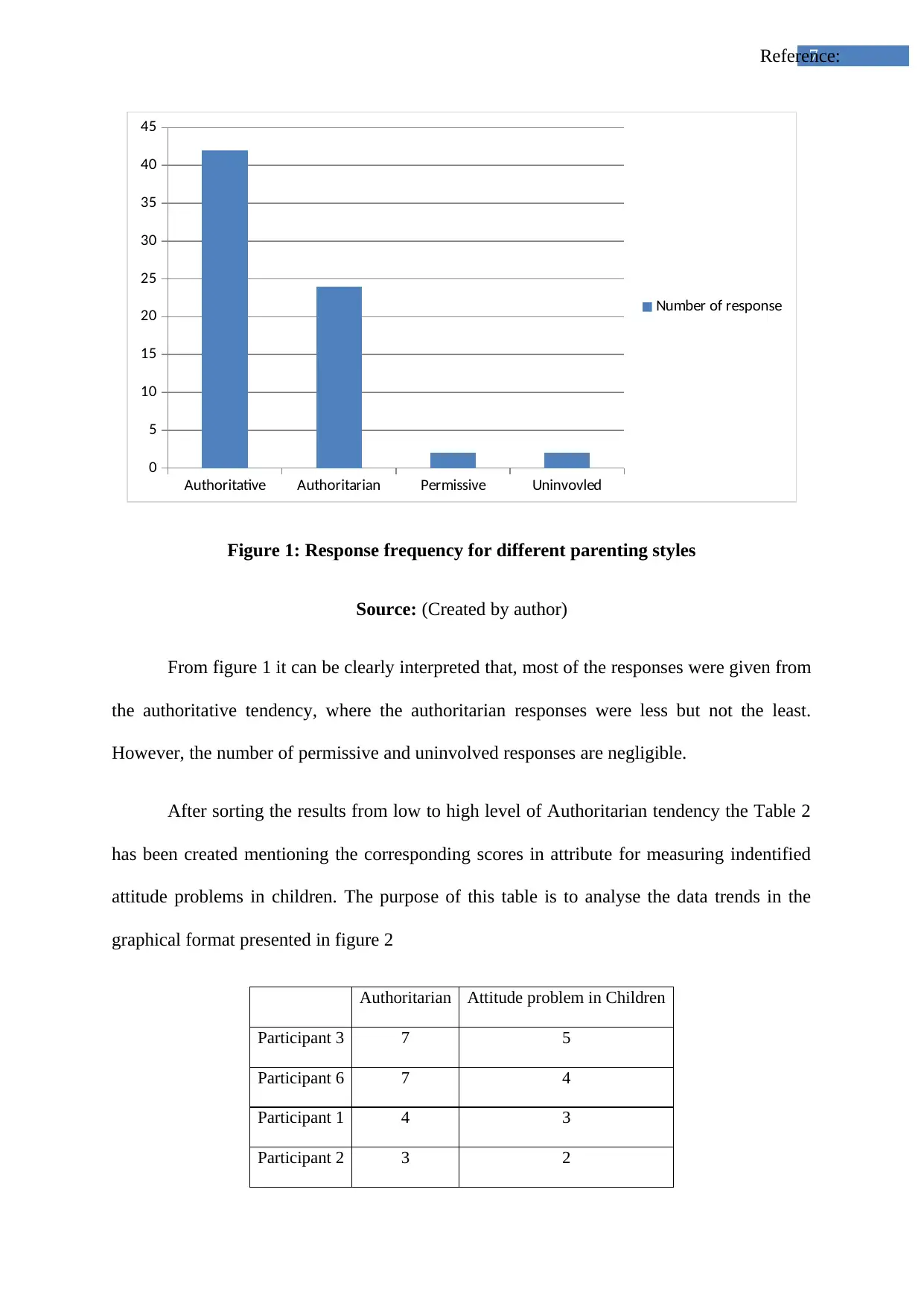
7Reference:
Authoritative Authoritarian Permissive Uninvovled
0
5
10
15
20
25
30
35
40
45
Number of response
Figure 1: Response frequency for different parenting styles
Source: (Created by author)
From figure 1 it can be clearly interpreted that, most of the responses were given from
the authoritative tendency, where the authoritarian responses were less but not the least.
However, the number of permissive and uninvolved responses are negligible.
After sorting the results from low to high level of Authoritarian tendency the Table 2
has been created mentioning the corresponding scores in attribute for measuring indentified
attitude problems in children. The purpose of this table is to analyse the data trends in the
graphical format presented in figure 2
Authoritarian Attitude problem in Children
Participant 3 7 5
Participant 6 7 4
Participant 1 4 3
Participant 2 3 2
Authoritative Authoritarian Permissive Uninvovled
0
5
10
15
20
25
30
35
40
45
Number of response
Figure 1: Response frequency for different parenting styles
Source: (Created by author)
From figure 1 it can be clearly interpreted that, most of the responses were given from
the authoritative tendency, where the authoritarian responses were less but not the least.
However, the number of permissive and uninvolved responses are negligible.
After sorting the results from low to high level of Authoritarian tendency the Table 2
has been created mentioning the corresponding scores in attribute for measuring indentified
attitude problems in children. The purpose of this table is to analyse the data trends in the
graphical format presented in figure 2
Authoritarian Attitude problem in Children
Participant 3 7 5
Participant 6 7 4
Participant 1 4 3
Participant 2 3 2
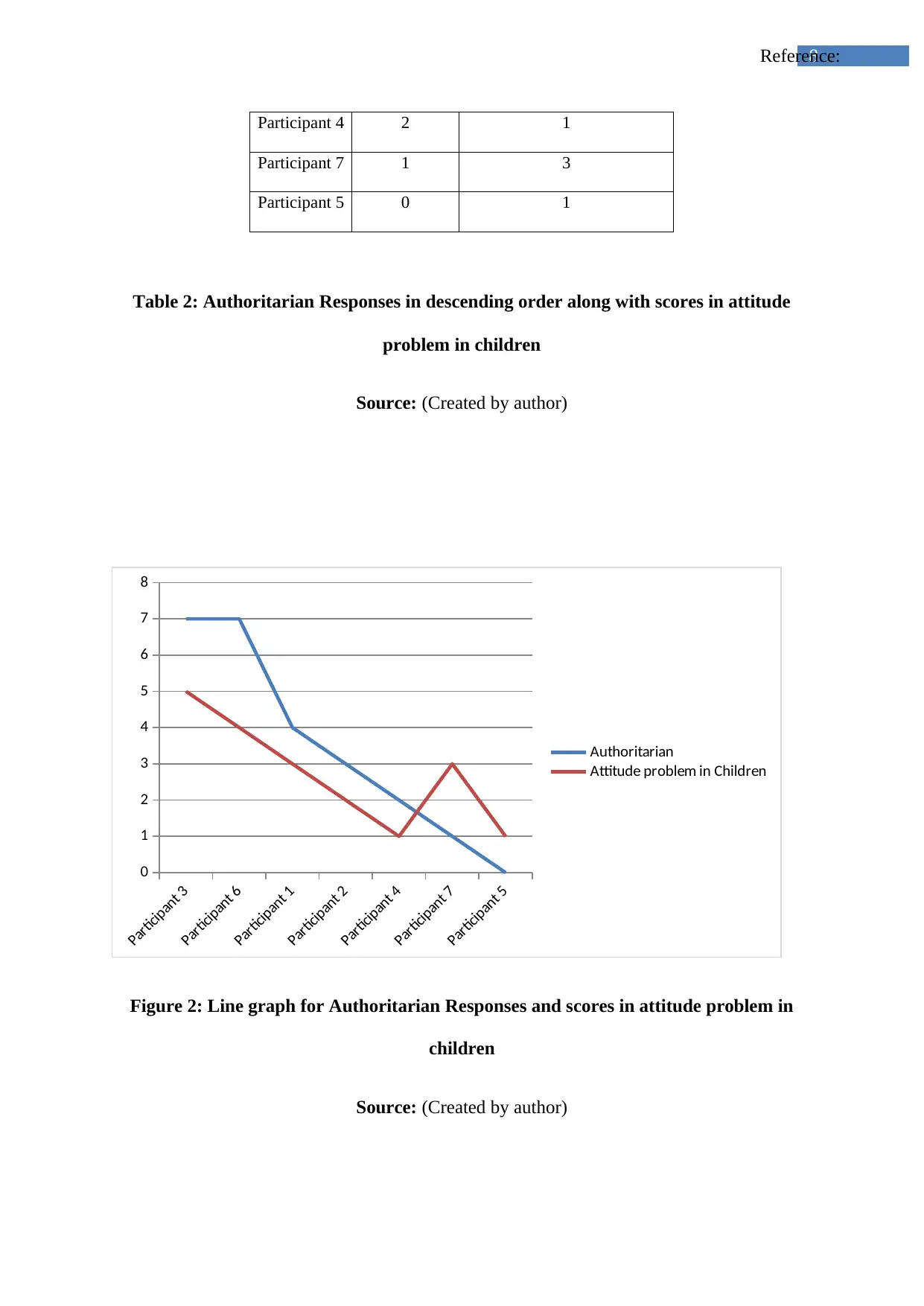
8Reference:
Participant 4 2 1
Participant 7 1 3
Participant 5 0 1
Table 2: Authoritarian Responses in descending order along with scores in attitude
problem in children
Source: (Created by author)
Participant 3
Participant 6
Participant 1
Participant 2
Participant 4
Participant 7
Participant 5
0
1
2
3
4
5
6
7
8
Authoritarian
Attitude problem in Children
Figure 2: Line graph for Authoritarian Responses and scores in attitude problem in
children
Source: (Created by author)
Participant 4 2 1
Participant 7 1 3
Participant 5 0 1
Table 2: Authoritarian Responses in descending order along with scores in attitude
problem in children
Source: (Created by author)
Participant 3
Participant 6
Participant 1
Participant 2
Participant 4
Participant 7
Participant 5
0
1
2
3
4
5
6
7
8
Authoritarian
Attitude problem in Children
Figure 2: Line graph for Authoritarian Responses and scores in attitude problem in
children
Source: (Created by author)
⊘ This is a preview!⊘
Do you want full access?
Subscribe today to unlock all pages.

Trusted by 1+ million students worldwide
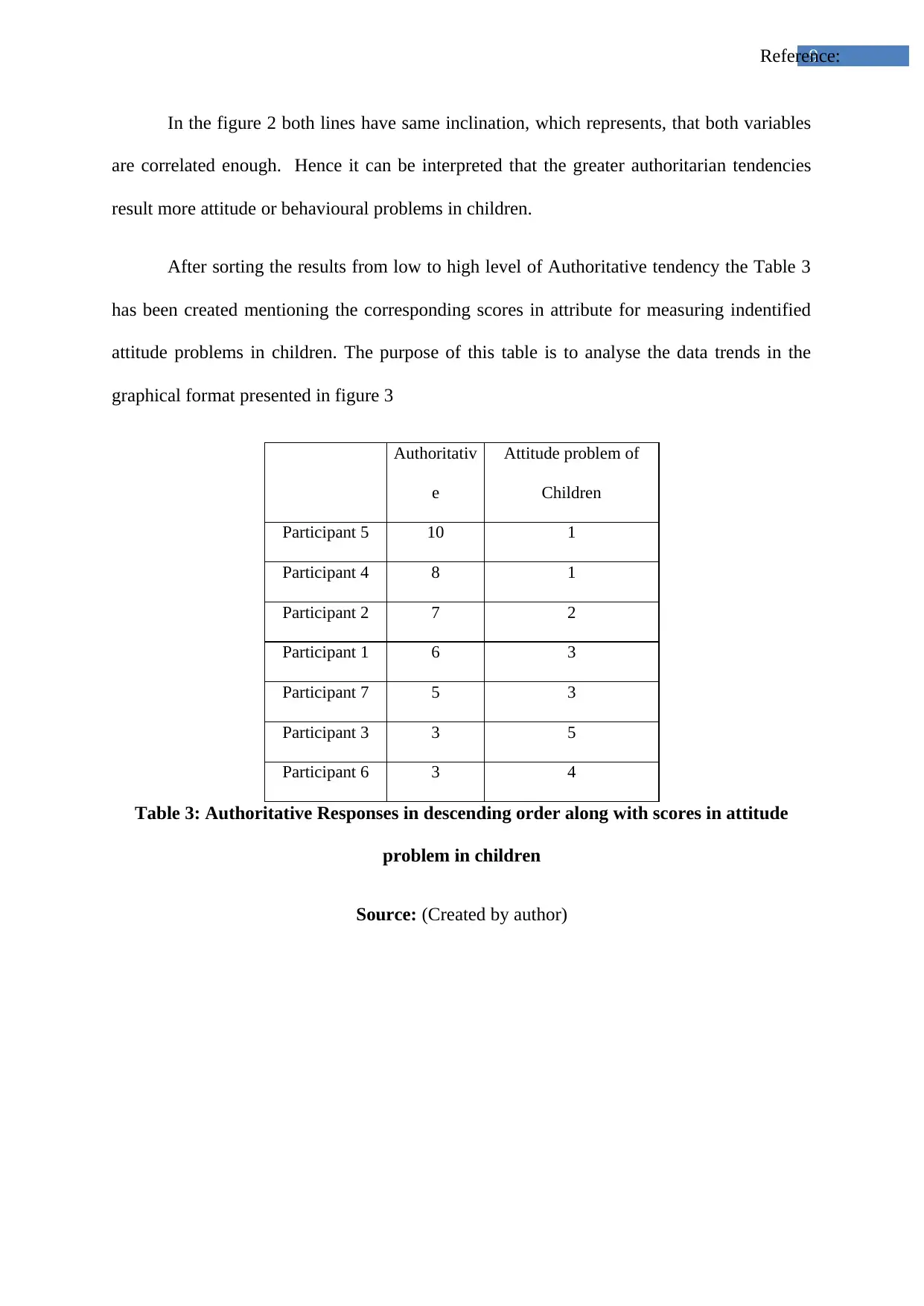
9Reference:
In the figure 2 both lines have same inclination, which represents, that both variables
are correlated enough. Hence it can be interpreted that the greater authoritarian tendencies
result more attitude or behavioural problems in children.
After sorting the results from low to high level of Authoritative tendency the Table 3
has been created mentioning the corresponding scores in attribute for measuring indentified
attitude problems in children. The purpose of this table is to analyse the data trends in the
graphical format presented in figure 3
Authoritativ
e
Attitude problem of
Children
Participant 5 10 1
Participant 4 8 1
Participant 2 7 2
Participant 1 6 3
Participant 7 5 3
Participant 3 3 5
Participant 6 3 4
Table 3: Authoritative Responses in descending order along with scores in attitude
problem in children
Source: (Created by author)
In the figure 2 both lines have same inclination, which represents, that both variables
are correlated enough. Hence it can be interpreted that the greater authoritarian tendencies
result more attitude or behavioural problems in children.
After sorting the results from low to high level of Authoritative tendency the Table 3
has been created mentioning the corresponding scores in attribute for measuring indentified
attitude problems in children. The purpose of this table is to analyse the data trends in the
graphical format presented in figure 3
Authoritativ
e
Attitude problem of
Children
Participant 5 10 1
Participant 4 8 1
Participant 2 7 2
Participant 1 6 3
Participant 7 5 3
Participant 3 3 5
Participant 6 3 4
Table 3: Authoritative Responses in descending order along with scores in attitude
problem in children
Source: (Created by author)
Paraphrase This Document
Need a fresh take? Get an instant paraphrase of this document with our AI Paraphraser
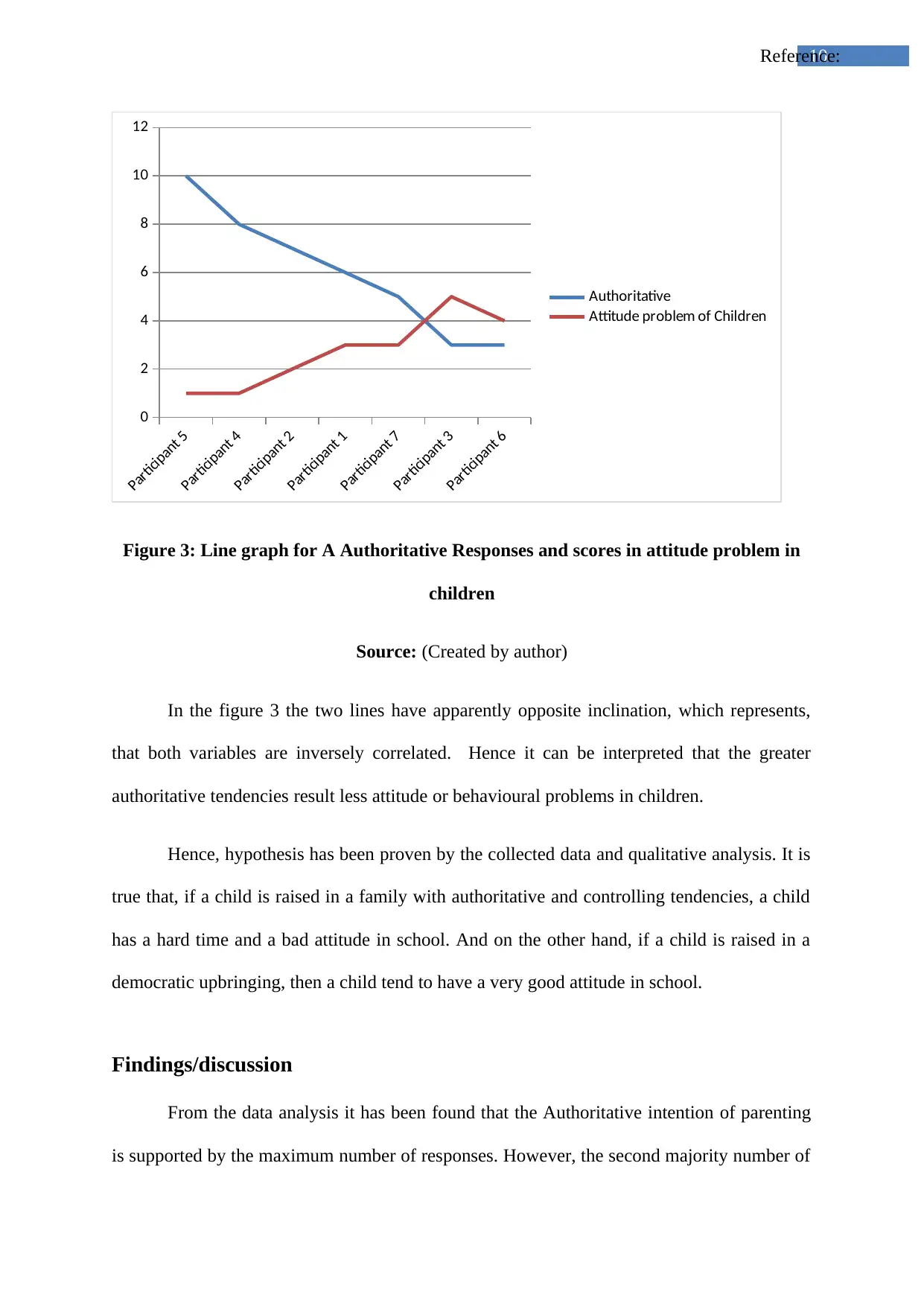
10Reference:
Participant 5
Participant 4
Participant 2
Participant 1
Participant 7
Participant 3
Participant 6
0
2
4
6
8
10
12
Authoritative
Attitude problem of Children
Figure 3: Line graph for A Authoritative Responses and scores in attitude problem in
children
Source: (Created by author)
In the figure 3 the two lines have apparently opposite inclination, which represents,
that both variables are inversely correlated. Hence it can be interpreted that the greater
authoritative tendencies result less attitude or behavioural problems in children.
Hence, hypothesis has been proven by the collected data and qualitative analysis. It is
true that, if a child is raised in a family with authoritative and controlling tendencies, a child
has a hard time and a bad attitude in school. And on the other hand, if a child is raised in a
democratic upbringing, then a child tend to have a very good attitude in school.
Findings/discussion
From the data analysis it has been found that the Authoritative intention of parenting
is supported by the maximum number of responses. However, the second majority number of
Participant 5
Participant 4
Participant 2
Participant 1
Participant 7
Participant 3
Participant 6
0
2
4
6
8
10
12
Authoritative
Attitude problem of Children
Figure 3: Line graph for A Authoritative Responses and scores in attitude problem in
children
Source: (Created by author)
In the figure 3 the two lines have apparently opposite inclination, which represents,
that both variables are inversely correlated. Hence it can be interpreted that the greater
authoritative tendencies result less attitude or behavioural problems in children.
Hence, hypothesis has been proven by the collected data and qualitative analysis. It is
true that, if a child is raised in a family with authoritative and controlling tendencies, a child
has a hard time and a bad attitude in school. And on the other hand, if a child is raised in a
democratic upbringing, then a child tend to have a very good attitude in school.
Findings/discussion
From the data analysis it has been found that the Authoritative intention of parenting
is supported by the maximum number of responses. However, the second majority number of
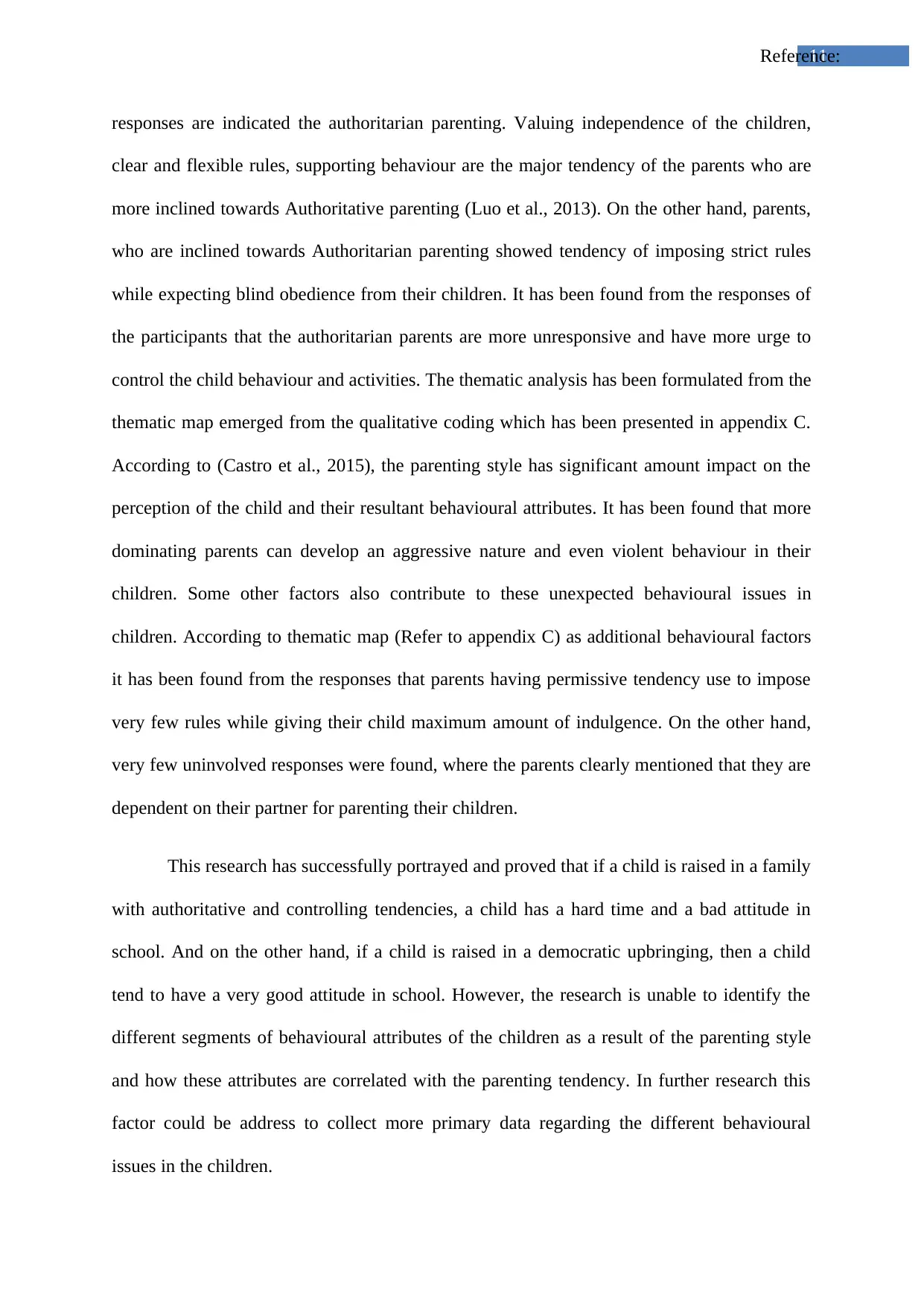
11Reference:
responses are indicated the authoritarian parenting. Valuing independence of the children,
clear and flexible rules, supporting behaviour are the major tendency of the parents who are
more inclined towards Authoritative parenting (Luo et al., 2013). On the other hand, parents,
who are inclined towards Authoritarian parenting showed tendency of imposing strict rules
while expecting blind obedience from their children. It has been found from the responses of
the participants that the authoritarian parents are more unresponsive and have more urge to
control the child behaviour and activities. The thematic analysis has been formulated from the
thematic map emerged from the qualitative coding which has been presented in appendix C.
According to (Castro et al., 2015), the parenting style has significant amount impact on the
perception of the child and their resultant behavioural attributes. It has been found that more
dominating parents can develop an aggressive nature and even violent behaviour in their
children. Some other factors also contribute to these unexpected behavioural issues in
children. According to thematic map (Refer to appendix C) as additional behavioural factors
it has been found from the responses that parents having permissive tendency use to impose
very few rules while giving their child maximum amount of indulgence. On the other hand,
very few uninvolved responses were found, where the parents clearly mentioned that they are
dependent on their partner for parenting their children.
This research has successfully portrayed and proved that if a child is raised in a family
with authoritative and controlling tendencies, a child has a hard time and a bad attitude in
school. And on the other hand, if a child is raised in a democratic upbringing, then a child
tend to have a very good attitude in school. However, the research is unable to identify the
different segments of behavioural attributes of the children as a result of the parenting style
and how these attributes are correlated with the parenting tendency. In further research this
factor could be address to collect more primary data regarding the different behavioural
issues in the children.
responses are indicated the authoritarian parenting. Valuing independence of the children,
clear and flexible rules, supporting behaviour are the major tendency of the parents who are
more inclined towards Authoritative parenting (Luo et al., 2013). On the other hand, parents,
who are inclined towards Authoritarian parenting showed tendency of imposing strict rules
while expecting blind obedience from their children. It has been found from the responses of
the participants that the authoritarian parents are more unresponsive and have more urge to
control the child behaviour and activities. The thematic analysis has been formulated from the
thematic map emerged from the qualitative coding which has been presented in appendix C.
According to (Castro et al., 2015), the parenting style has significant amount impact on the
perception of the child and their resultant behavioural attributes. It has been found that more
dominating parents can develop an aggressive nature and even violent behaviour in their
children. Some other factors also contribute to these unexpected behavioural issues in
children. According to thematic map (Refer to appendix C) as additional behavioural factors
it has been found from the responses that parents having permissive tendency use to impose
very few rules while giving their child maximum amount of indulgence. On the other hand,
very few uninvolved responses were found, where the parents clearly mentioned that they are
dependent on their partner for parenting their children.
This research has successfully portrayed and proved that if a child is raised in a family
with authoritative and controlling tendencies, a child has a hard time and a bad attitude in
school. And on the other hand, if a child is raised in a democratic upbringing, then a child
tend to have a very good attitude in school. However, the research is unable to identify the
different segments of behavioural attributes of the children as a result of the parenting style
and how these attributes are correlated with the parenting tendency. In further research this
factor could be address to collect more primary data regarding the different behavioural
issues in the children.
⊘ This is a preview!⊘
Do you want full access?
Subscribe today to unlock all pages.

Trusted by 1+ million students worldwide
1 out of 35
Related Documents
Your All-in-One AI-Powered Toolkit for Academic Success.
+13062052269
info@desklib.com
Available 24*7 on WhatsApp / Email
![[object Object]](/_next/static/media/star-bottom.7253800d.svg)
Unlock your academic potential
Copyright © 2020–2026 A2Z Services. All Rights Reserved. Developed and managed by ZUCOL.





